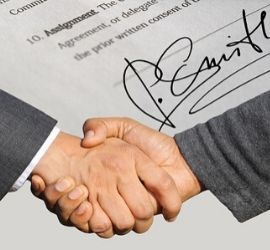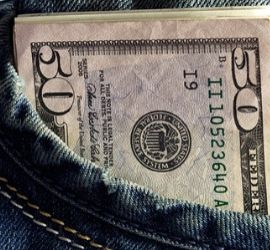How to Sign Over a Check – How to Sign a Check Over to Someone Else
 When a check is made payable to you, you’re the only person who can do anything with it. A check is a piece of paper that instructs a bank or credit union to pay a specific sum of money to a particular person, company, or organization. The recipient is known as the payee.
When a check is made payable to you, you’re the only person who can do anything with it. A check is a piece of paper that instructs a bank or credit union to pay a specific sum of money to a particular person, company, or organization. The recipient is known as the payee.
To be valid, a check must include a date, the payee’s name, and the amount. It is authorized by a signature from the checking account holder through which the money will be withdrawn.
To receive the funds, the payee must sign, or endorse, the back of the check. This signature, called an endorsement, informs the bank or credit union that whoever signed the check is the payee and wants to accept the money. If you don’t want to cash a check or deposit it yourself, you might be able to sign the check over to somebody else. That person would then deposit into their account or simply cash it.
How to Endorse a Check
To endorse a check, you simply turn it over and sign your name on the back. Most checks give you a space on the back for your endorsement. You’ll see a few blank lines and an “x” that indicates where you should sign your name. The back of the check might also say, Endorse here and Do not mark below this line. The warning is there because the bank also uses the back of the check, below the endorsement, for check-processing purposes.
How to Sign a Check Over to Someone Else
To sign a check over to someone else, first, verify that a bank will accept the check. Then you can endorse the back of the check by signing it. Some banks require you to write Pay to the order of – Person’s First and Last Name under your signature. Other banks only require the person who is depositing it to sign their name under yours. Essentially, that’s all there is to it. Now you can pass the check on to that person so they can deposit or cash the check. Follow these four simple steps:
How to Sign Over a Check – 4 Steps
- Confirm the person will accept a signed-over check before endorsing a check to someone else. You must designate exactly who you are signing your check over to. The process of cashing or depositing a third-party check is not guaranteed. Banks are not obligated to take third party checks, but most do. However, it’s important to make sure the person you designate approves.
- Verify that the person’s bank will accept the check. The person accepting the check should ensure that their bank will honor a third party check. This should be confirmed before the check is endorsed. You don’t want to end up with a bunch of confusing endorsements on the back of your check.
- Sign the back of the check. Sign it in the designated endorsement area. Every check has an area on the back that states – Endorse Check Here. Sign your name in that area as it appears on the front of the check.
- Write Pay to the Order of and fill in the third party’s name below your signature. You must designate the person that you are signing the check over to in the endorsement area under your signature. This lets the bank know that you are endorsing the transfer of ownership to the third party you have designated.
Endorsing a Check to Someone Else
If you need to sign a check over to someone else, make sure to do it properly. Usually, when you deposit a check, you first need to sign the back of it. This is called endorsing the check. Underneath the line where you sign the check is a small area for notes. To sign a check over to someone else you should first endorse it, then write “Pay to the order of:” followed by the person’s name. Your signature, combined with that message, indicates that you’re giving up your claim to the check and transferring it to the person you specified. It’s then up to the bank whether to honor the check. (Source: mybanktracker.com)
How to Sign Over a Check – Will the Bank Allow It?
All banks might not be willing to accept checks that have been signed over to a third party. A third party is somebody besides the check writer and the original payee. It’s perfectly legal to try, but banks aren’t required to honor your instructions. They may have policies against this practice or they may think that a third-party check increases the chances of the check not being honored. It is a bank’s prerogative to refuse to deposit or cash the check, so ask before you endorse it. If you must sign a check over to somebody else, have them check with their bank before you endorse the check.
You don’t want to add extra signatures and names to the back of the check (which will create confusion and delays at the next place you try to cash the check). Find out if it’s allowed and what the requirements are. Things might go more smoothly if you go to the bank with the person depositing the check so the bank has more confidence that nothing fishy is going on. (Bring ID, of course.) Banks are essentially giving your money to somebody else when you use this approach. Unfortunately, the risk is often too great for them to accept. They can’t verify your identity or your signature—they just have to take the third party’s word for it. (Source: thebalance.com)
How to Sign Over a Check – Alternative Solutions
Signing a check over to somebody is not an ideal solution, and sometimes it’s simply not an option. The strategies here might be slower than endorsing a check to someone else, but at least you can be confident that they’ll work.
- If You Have a Bank Account – If you need to pay somebody with money you’ve received by check, try cashing or depositing the check yourself to avoid any hassles. The first $200 of funds will typically be available from a check within one business day (or the first $5,000 if it’s a cashier’s check).4 There are numerous ways to send money online for free and those methods might be a lot easier than dancing around bank policies.
- If You Don’t Have a Bank Account – If you don’t have a bank account or any other way to handle checks, open an account. Some types of bank accounts can cost money, but not having an account probably costs you even more. There are several ways to get free checking accounts, especially at local credit unions and online banks.
- If It’s Difficult to Get to Your Bank – If your bank doesn’t have a branch or ATM where you are, or it’s inconvenient for you, try a Mobile check deposit. This allows you to take a picture of a check—often for a same-day deposit. Then you can withdraw cash or send money electronically.
- Credit unions: If you’re a credit union customer, then you might be able to use branches of other credit unions. This is assuming they participate in the shared branching network.
- Consider a Check Cashing Service – You could try a check-cashing service, but those fees are typically quite high. Several retail stores have been known to cash checks for free, especially tax refund checks.
Depositing a Check for Somebody Else
If somebody asks you to deposit a check written to them, think carefully before you do so. You are risking your own money and your good standing at the bank if you agree. If the check bounces for any reason, your bank will demand that you replace the funds. You will be liable for the funds even though the check was written to your friend and you were just doing a favor. Your account could be overdrawn, and the funds will be taken from your balance if it’s a bad check. You can try to collect funds from your friend, but this is often difficult. Also, never agree to cash a check for a stranger. There are many scams that use third party checks on good-hearted, but naive individuals.
Don’t Get Scammed
Can you lose money by helping somebody? By law, banks often allow you to get cash from a check before it actually clears. The funds will show up in your available balance. It looks like you can spend all of that money if you want to. Later, your bank actually processes the check and tries to collect money for it. It can take days or weeks for your bank to find out that the check was not good, to begin with. Never hand over cash unless you really know and trust the person you’re helping. Unfortunately, if you cash a check for somebody else and the check is bad, the bank will charge you back for the funds.
These scams work because fake checks generally look just like real checks, even to bank employees. They are often printed with the names and addresses of legitimate financial institutions. They may even be real checks written on bank accounts that belong to identity theft victims. It can take weeks for a bank to figure out that the check is a fake. By law, banks have to make deposited funds available quickly, usually within two days. When the funds are made available in your account, the bank may say the check has “cleared,” but that doesn’t mean it’s a good check. Fake checks can take weeks to be discovered and untangled. By that time, the scammer has any money you sent, and you’re stuck paying the money back to the bank. (Source: consumer.ftc.gov)
How to Sign Over a Check – Conclusion
Signing a check over to someone else lets them deposit it into their account, but this doesn’t always work. It is best if you try depositing or cashing the check yourself when you can. Only sign it over to someone else as a last resort.
If you must sign a check over to someone else, make sure that both the receiving bank and issuing bank allows that type of transaction. It’s entirely possible to sign a check over to someone else. However, it’s best to call your bank, explain your situation, and see what your options are. Some banks have a strict policy regarding signing a check over to another party, and won’t cash it. Other banks will allow the transaction but want the check endorsed in a specific way.



